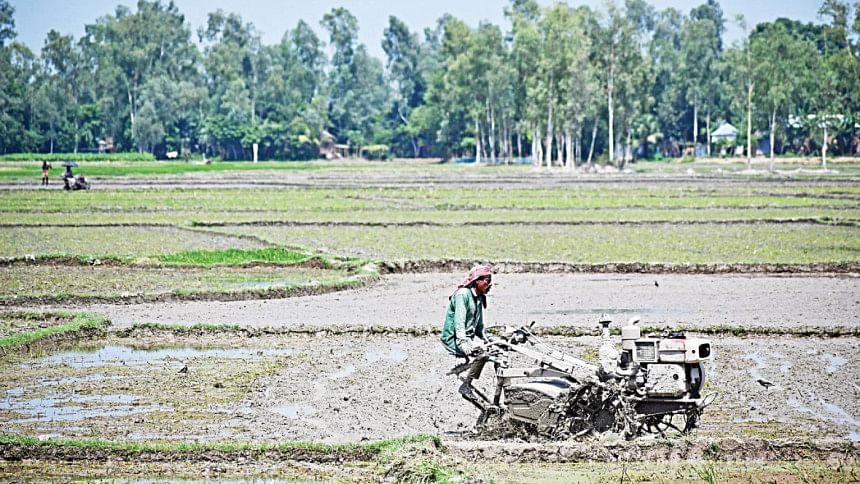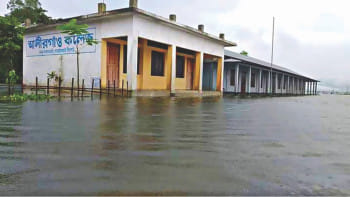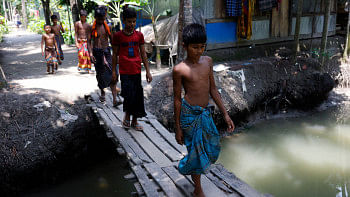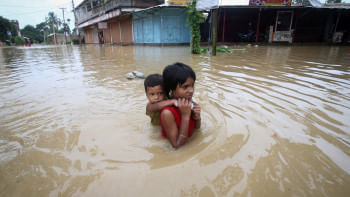How are our farmers adapting to climate change?

The effects of climate change are already being felt in Bangladesh, with rising temperatures, unpredictable rainfall, and longer droughts making it difficult for farmers in the country to continue growing crops. In the face of these challenges, farmers in Bangladesh are increasingly adopting climate-resilient farming techniques and finding new ways to ensure their livelihoods.
Climate-resilient farming techniques help farmers adapt to the impacts of climate change and also enhance their productivity in a sustainable manner. Some of these techniques that can be applied in Bangladesh are crop diversification, crop rotation, improved irrigation management, floating gardening, raised-bed farming, conservation agriculture (CA), agroecology, agroforestry, and sustainable land management using organic fertilisers.
Monir Hossain, a farmer living on the periphery of Pirojpur district, has been using raised beds to grow crops such as cucumbers, aubergines, and pumpkins. By building beds six inches above the ground, Hossain can ensure that his crops are protected from waterlogging, which can be a major problem during monsoon. In addition, Hossain has been using drip irrigation—a water-saving method that delivers water directly to the roots of plants through a network of tubes or pipes—to water his crops, thus cutting down on wastage and ensuring that the plants get the right amount of water.
Providing access to climate information and early warning systems can help farmers prepare and plan for climate change impacts. Structured training is also crucial for building confidence in stakeholders and sensitising them to the impacts of climate change. The government and policymakers need to prioritise indigenous knowledge and locally-led adaptation to form the correct agricultural policies.
Naimul Islam, a farmer from the same district, switched from mono-cropping to mixed-cropping rice, vegetables, and spices. He faced multiple challenges due to the changing climate, such as longer drought periods, saline water intrusion, and extreme weather events. To cope with these challenges, Naimul diversified his farming system and started growing high-value crops such as chilli, ginger, and cauliflower. He also adopted organic farming practices, which he learned from a local NGO, and reduced his dependence on chemical fertilisers and pesticides. As a result, Naimul's income increased by approximately 50 percent, and he became a model farmer in his community.
Other farmers in the district are also using organic fertilisers and other soil management techniques to improve the health of their soil and increase yields.
These climate-resilient farming techniques are proving to be successful, with farmers in the Pirojpur district seeing improved yields and better incomes. One farmer, Sabina Khatun, has seen her income increase from Tk 15,000 to Tk 30,000 per year by adopting crop rotation techniques even on a small land. Khatun is now able to pay for her children's education and has even been able to invest in new land to expand her farm.
But it's not just about economic benefits—these techniques also have positive environmental impacts, with reduced water usage and more sustainable farming practices.
Farmers in Bangladesh have been able to successfully produce agricultural crops mostly by utilising indigenous knowledge. They have been able to cultivate various crops using their own traditional farming methods, such as using organic fertilisers, crop rotation, and integrated pest management. They have also adapted to climate change and flooding by utilising their knowledge of crop diversification and growing flood-tolerant crops. Additionally, they have been able to utilise water harvesting techniques to combat water scarcity during the dry season. Through such use of traditional agricultural practices, they have been able to contribute to the country's food security.
Still, Bangladesh is one of the most climate-vulnerable countries and we should assist our farmers in learning climate-resilient farming techniques, as the livelihood of more than half of the population depends on agriculture. In this regard, there are various measures to be taken.
Providing access to climate information and early warning systems can help farmers prepare and plan for climate change impacts. Structured training is also crucial for building confidence in stakeholders and sensitising them to the impacts of climate change. The government and policymakers need to prioritise indigenous knowledge and locally-led adaptation to form the correct agricultural policies. We should also strengthen the capacity of farmers and local organisations in terms of managing agricultural risks and building resilience.
The farmers in Bangladesh are taking on climate change-induced challenges bravely, and their tact seems to be paying off. By adapting farming techniques to suit the changing environment, our farmers are securing their food supply and laying the groundwork for a sustainable future. As climate change continues to pose challenges for communities across the globe, and with Bangladesh being one of the worst sufferers, it is the resilience of these farmers which will bring about positive change.
Md Ariful Islam is a researcher whose area of interests include climate change, migration, and gender inequality.
Views expressed in this article are the author's own.
Follow The Daily Star Opinion Facebook for the latest opinions, commentaries and analyses by experts and professionals. To contribute your article or letter to The Daily Star Opinion, see our guidelines for submission.

 For all latest news, follow The Daily Star's Google News channel.
For all latest news, follow The Daily Star's Google News channel. 











Comments